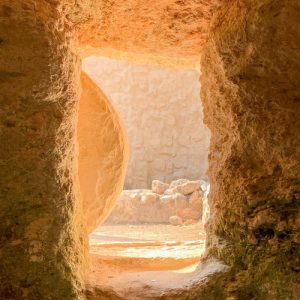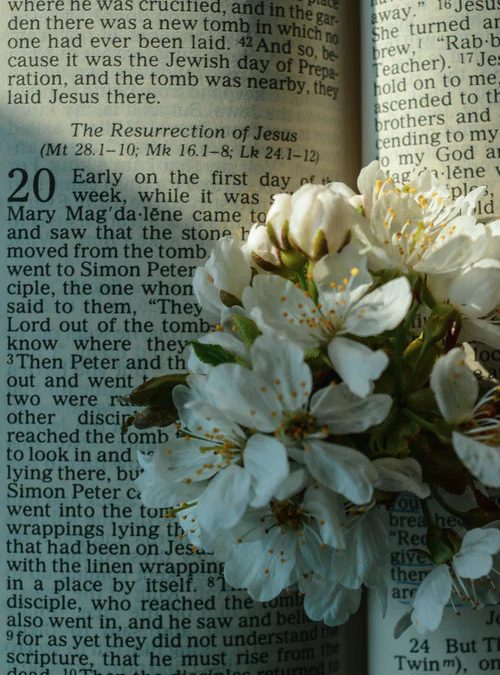by Rev. Dr. Linda Hartley, Assoc. Minister
“He is not here. He is risen.”
These are the words the holy messenger speaks to the women when they come to the tomb to anoint Jesus’ body on the third day after his crucifixion. Depending on your translation and which Gospel you’re reading, the specific words may change. But in each, God’s holy messengers deliver a similar statement of fact: “He is not here. He is risen.”
Seven simple words. Every time I read them, or hear them read, I feel a sense of awe and wonder. And yet, even as I hear the words in this way, they are not delivered in that way. They are delivered in a straightforward, matter-of-fact manner like we might state “the sun has come up,” or “it’s raining outside.” There’s no dramatic flourish, just a simple statement –“He is not here.” And as Mary Magdalene, Mary the mother of James, and the other women can plainly see, Jesus is not there. That part they can see with their eyes. And that alone raises enough questions for them. Questions about what happened to his body, and who might have taken it. Questions that express our very human comprehension of death.
Of course, as they’re still grappling with these questions, they are also trying to take in the rest of the messenger’s statement – “He is risen.” This now requires a shift in comprehension. This now asks them to move beyond what they “know.” This asks them to set aside what they “know” so they might see what their faith tells them is true. I wonder if, in that moment, the women could take in all that those three words meant. Even after they had witnessed Jesus’ healings, heard his teachings, and felt the promise of God’s kingdom coming into the world, could they really take in all that those words held within them? Could the depth of their grief turn around that quickly that they could wrap their heads and hearts around the joyful implications of that statement?
This asks them to set aside what they “know” so they might see what their faith tells them is true. I wonder if, in that moment, the women could take in all that those three words meant. Even after they had witnessed Jesus’ healings, heard his teachings, and felt the promise of God’s kingdom coming into the world, could they really take in all that those words held within them? Could the depth of their grief turn around that quickly that they could wrap their heads and hearts around the joyful implications of that statement?
Perhaps this is why Matthew tells us that the women left the tomb with “fear and great joy.” Mark tells us that the women left with “terror and amazement.” No matter the words, both writers are clear that living within our human experience as we do, we have a difficult time wrapping our heads around all that God can do. This is the wonder and the joy of Easter – God’s promise that no matter how many times, and in how many ways, the world says “No,” God has the final word, and it is “Yes! – “Yes, My love is greater than anything the world can dish out. Yes, My love for you endures forever… and Yes, My love for you is stronger even than death.”
 And so, we celebrate on Easter morn with the joyful remembrance of the resurrected Christ. We sing our Alleluias. We sing that Christ the Lord is risen today. Easter truly is the ultimate Day of New Beginnings because in the words of that hymn, “Christ goes before us to show and share what love can do.” We rejoice that no matter what we are experiencing, we share the hope and the faith that “our God is making all things new.” In many ways, we too stand with the women at the tomb urging our hearts and our minds to comprehend all that those words hold within them – “He is risen.” And we too rejoice.
And so, we celebrate on Easter morn with the joyful remembrance of the resurrected Christ. We sing our Alleluias. We sing that Christ the Lord is risen today. Easter truly is the ultimate Day of New Beginnings because in the words of that hymn, “Christ goes before us to show and share what love can do.” We rejoice that no matter what we are experiencing, we share the hope and the faith that “our God is making all things new.” In many ways, we too stand with the women at the tomb urging our hearts and our minds to comprehend all that those words hold within them – “He is risen.” And we too rejoice.
We will rejoice this Easter in ways both familiar and different from Easters past. We will join together online for our Easter worship service with beautiful music from our choir, and a bell solo, as well as a musical gift from the Hallelujah Chorus composed of choir members from churches in the Rhode Island Association of the UCC. We will celebrate the many generations within our faith community with contributions from our children and elders, including a joy-filled Easter Hat parade. We hope you will join us on Facebook or our website to sing out our Alleluias loud and strong for “He is risen indeed.”
Of course, the story does not end there on that glorious morning. In many ways, that day truly was just the starting point of a new beginning. Through the work of Jesus’ disciples – now apostles – the story continued. Through their work, the message of Jesus Christ spread into new communities around the Mediterranean and grew to include more diverse populations. A new movement was born, a movement that required a lot from Jesus’ followers as they too experienced times of “fear and great joy.” It’s a story of successes and challenges, of camaraderie and divisions. It’s a story of the Christian church, and it is our story.
the message of Jesus Christ spread into new communities around the Mediterranean and grew to include more diverse populations. A new movement was born, a movement that required a lot from Jesus’ followers as they too experienced times of “fear and great joy.” It’s a story of successes and challenges, of camaraderie and divisions. It’s a story of the Christian church, and it is our story.
In the weeks after Easter, Dale and I will be offering a sermon series on this part of the story and looking at what this story says to us today. We hope you will join us in the coming weeks as we explore issues of evangelism, inclusion, and diversity in the early church and how these inform who we are today and the community of faith that we strive to become. Join us as we explore what it means to be “Easter people.”



